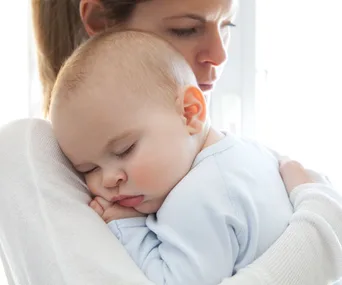Movement milestones, mental development and staying healthy
Movement milestones
If your baby has been crawling for a while she may now pull up from a seated position to standing, squat while holding on or sit back down, and cruise around while holding onto the furniture or your hands. When babies begin crawling, they can learn with surprising speed. She may develop coordination and strength quickly, progressing from being a new crawler to a confident traveller within days.
At this age your baby might also:
bounce to music
copy simple sounds
cooperate more when she’s getting dressed
easily pick things up using her thumb and pointer finger.
Remember, each baby is unique and there is no set development schedule for babies. The age at which they learn to crawl or speak varies widely and has no bearing on their intelligence or ability to learn later on during school years.

Your 10-month-old may enjoy bouncing to music. *(Image: Getty Images).
Mental development
Your baby will also repeat sounds, gesture for your attention, and may even wave goodbye when she sees you head for the door. Her babbling is more like a real conversation now, with rising and falling intonations and exclamations. Your baby may even say one word you can understand.
Bub also shows understanding of what other people are thinking, especially when she looks at you to gauge your reaction before she embarks on a forbidden activity, like throwing her sippy cup.
Here’s a list of skills your 10 month old may soon master:
Points or goes for items they want
Babbles and imitates words
Waves “bye-bye”
Starts to say simple words like “Mama” and “Dada”
Shows curiosity for how things work
May express separation anxiety
Shows new personality traits
Understands simple one-word phrases
Your baby’s health
Through breastfeeding, natural development and vaccination, your baby’s immune system is forming defences against most viruses, but a mild illness or two is likely at some point during her first year.
Having cared for your bub for ten months, by now you are very familiar with what’s normal and what could be a possible symptom of illness. Temperature, feeding, bowel movements, sleeping patterns, physical behaviour and audible expressions are all important indicators of how well or unwell they are. For example if your baby looks miserable or sounds ‘wet’, has noisy breathing and perhaps a cough, they could have a cold.
From the age of one month, you can give babies the recommended dose of infant paracetamol to help alleviate the discomfort of illness, like trouble breathing, eating or sleeping. However check with your doctor before giving any other medications, and if you are in doubt or worried, seek medical advice straightaway.

